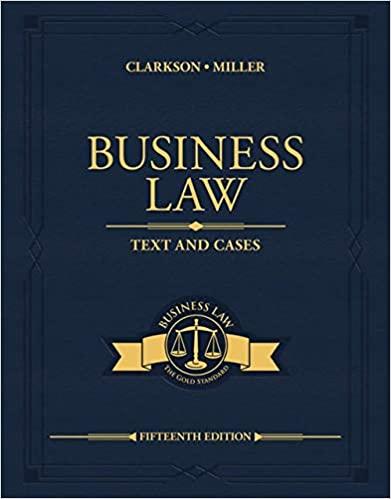Answered step by step
Verified Expert Solution
Question
1 Approved Answer
1. Generally speaking, there must be a connection between the immoral acts of a teacher and their ability to teach before courts will uphold terminations
1. Generally speaking, there must be a connection between the immoral acts of a teacher and their ability to teach before courts will uphold terminations for immoral conduct. True False 2. Given the influence teachers have on children, educators are typically held to a higher standard of conduct than other members of the general public. True False 3 Insubordination is usually defined as the willful refusal to follow legitimate directives from administrative superiors. True False 4 In some cases, one act of insubordination is enough to justify termination. True False 5 In order for a teacher to be terminated for insubordination, there must be a connection with their capacity to effectively teach. True False 6 Defenses to insubordination include that the refusal to follow the directive was admirable or that the employee tried unsuccessfully to comply. True False 7 Termination for incompetence can arise out of a single incident or indiscretion. True False 8 If an employee who had a clear criminal history is convicted of a crime involving moral turpitude or a felony and he or she fails to notify the district, they may be terminated. True False 9 An at will employee can be terminated for any reason or no reason at all. True False 10 Teachers under a probationary contract can only be non-renewed for good or just cause. True False 11 Probationary contracts are reserved for teachers with no teaching experience. True False 12 Although notice must be provided by the statutory deadline, no specific reason has to be provided and no hearing has to be held for teachers under probationary contracts, unless called for under a collective bargaining agreement or state law. True False 13 If a teacher receives a series of annual contracts resulting in longevity of employment, a property right has been established and non-renewal cannot take place without good cause. True False 14 Terminations mid year require good cause regardless of the type of contract covering the teacher in question. True False 15 Due process hearings for teachers facing termination are largely based on state and local laws that are strictly enforced. True False 16 Good cause can be defined as any conduct that fails to meet the accepted standards of conduct for the profession. True False 17 The main difference between probationary contracts and term contracts surrounds the reasons for non-renewal which, in the case of the term contract, must be listed in board policy and only made after a consideration of the teachers evaluation. True False 18 If a coach is working under a unified contract, resignation or termination of either portion of the contract will result in termination or resignation of both parts of the contract. True False 19 If a court rules that a district erred when it non-renewed a teacher contract, not only will the affected employee receive back pay and benefits, but he or she can also recover punitive damages. True False 20 If the actions of a teacher away from school significantly impairs or diminishes their capacity to teach, they cannot be terminated if they are under a continuing contract. True False 21 Reductions in force which are the result of a lower enrollment allows a district to non renew any teacher without the need to consider if they are qualified for another remaining position. True False 22 Since non-renewal alone damages a teacher's reputation, they are entitled to a due process hearing. True False 23 In most cases, teachers facing termination must exhaust administrative or grievance procedures before asking for judicial review. True False 24 Verbal assertions by building principals established valid contracts if the teacher or employee in question detrimentally relies on their promise. True False 25 All teachers terminated mid year are being denied a property right arising under the existing contract and are therefore entitled to procedural due process. True False 26 If an administrator wants to run off a troublesome teacher, they can make things difficult for a teacher, but if they make things too difficult, they can be held liable for constructive discharge. True False 27 If a teacher is reassigned to a different grade level or a different school, they have the right to a due process hearing even when the compensation remains the same. True False 28 Districts may not establish residency requirements since these requirements violate the constitutionally protected right intrastate travel and substantive due process. True False 29 Districts are free to include additional requirements for continued employment beyond basic state certification requirements as long as those additional requirements do not violate an employee's constitutional rights. True False
Step by Step Solution
There are 3 Steps involved in it
Step: 1

Get Instant Access to Expert-Tailored Solutions
See step-by-step solutions with expert insights and AI powered tools for academic success
Step: 2

Step: 3

Ace Your Homework with AI
Get the answers you need in no time with our AI-driven, step-by-step assistance
Get Started


